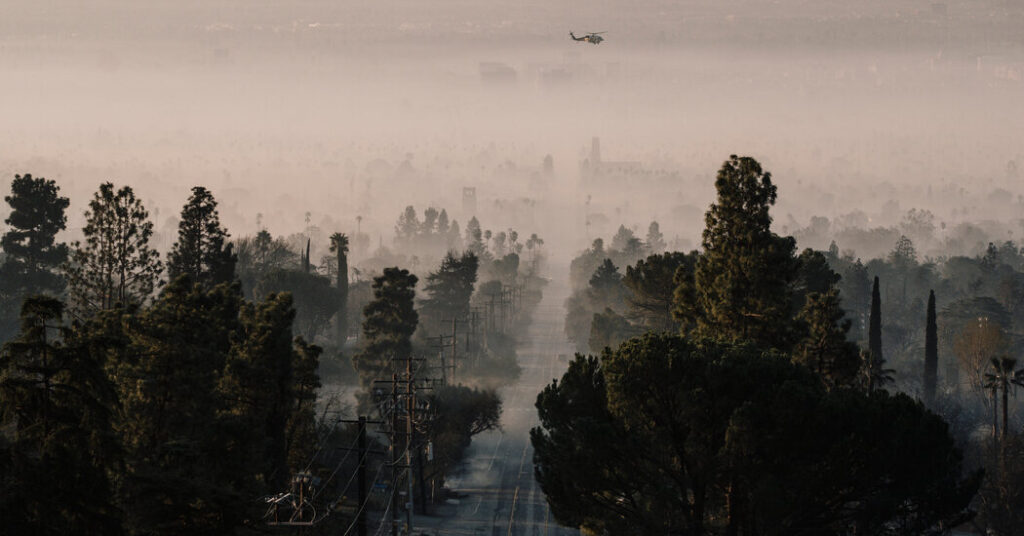A new survey released on Wednesday found that the Los Angeles wildfires took an extraordinary financial and emotional toll on millions of people in Southern California that extended far beyond the communities that burned.
More than 40 percent of the adults surveyed said they knew someone who had been personally affected by the wildfires that began on Jan. 7. The polling equivalent of more than a million adults said the fires had directly cost them jobs or income. And about a third of respondents said they had donned masks to protect themselves from the smoke hazards.
The survey, by the Luskin School of Public Affairs at the University of California, Los Angeles, underscored the extent to which the fires transcended the vastness of Southern California, where even large-scale disruptions can often be swallowed up by the region’s sheer size.
Los Angeles County, the nation’s most populous at about 9.7 million residents, stretches for more than 4,000 square miles, encompassing 88 cities and about a quarter of the state’s population. The two main January fires — in Pacific Palisades on the Pacific Coast and in Altadena to the east, at the base of the San Gabriel Mountains — were more than 34 miles apart.
But as hurricane-force winds whipped up one inferno after another, claiming 30 lives and destroying thousands of buildings, the threat of the disaster seemed to stretch countywide. The survey found that even in relatively unscathed places 20 miles or more from the fires, like the suburbs on the Palos Verdes Peninsula and in northern areas of the county, roughly a quarter of respondents said they knew someone who had lost a home or a business.
“In the past, wildfires here have been compartmentalized,” said Zev Yaroslavsky, a former Los Angeles city councilman and county supervisor who directs the Luskin School’s Los Angeles Initiative, which conducted the survey.
“But this time, the fires were everybody’s problem,” he continued. “Everybody had a stake in it. Everybody was threatened to one degree or another. It was a communitywide disaster, like an earthquake. Except that, even here, we’ve never had an earthquake that destroyed 15,000 homes.”
The fires also have posed political challenges, particularly for Mayor Karen Bass of Los Angeles, the poll showed.
Ms. Bass, who had been in Ghana on behalf of the Biden administration when the fires broke out, was among the most popular and best-known Democrats in Southern California in 2022, when she was elected. A former community organizer, legislator and member of Congress, Ms. Bass, who is Black, had deep roots in Los Angeles’s Black communities and broad liberal support that transcended demographic lines.
But the survey showed that her popularity had plummeted after the wildfires. Last year, 42 percent of the survey’s respondents viewed her favorably, and only 32 percent expressed an unfavorable opinion. This year, only 37 percent viewed her favorably, and nearly half viewed her unfavorably.
Support among Black residents has remained solid, the survey showed, but it has slipped significantly among other demographics, particularly white residents, of whom 60 percent said they now view her unfavorably. Other Los Angeles leaders, including members of the county’s board of supervisors, experienced no such slide in their popularity from last year.
The survey has been conducted for the past decade to measure satisfaction with the quality of life in Los Angeles County. This year’s poll, which took place in late February and early March among 1,400 adult residents, was the latest one to reflect the shaken mood among Californians in the aftermath of the wildfires.
In an earlier poll, cosponsored by The Los Angeles Times and conducted in February by the Institute of Governmental Studies at the University of California, Berkeley, almost a quarter of the county’s residents said the fires had prompted them to consider moving out of Southern California, though only 9 percent had considered it seriously.
In the Luskin survey, nearly nine respondents in 10 believed that people who had lost homes in communities such as Pacific Palisades and Altadena should be allowed to rebuild in the same location. And with the cost of living as the top concern of respondents, a slim majority supported some sort of tax increase to fund improvements in the county’s wildfire preparedness.
“This is going to scar the psyche of Los Angeles for a long time,” Mr. Yaroslavsky said. “I think people are going to mark their lives by it. There will be ‘before the fire,’ and ‘after the fire.’”
https://www.nytimes.com/2025/04/16/us/los-angeles-fires-survey.html


